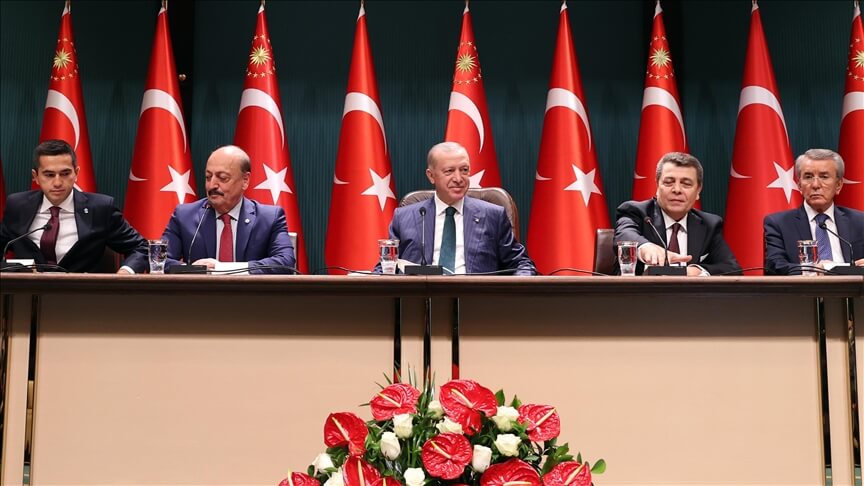Turkey will raise its minimum wage by 50% starting January 1 next year, President Recep Tayyip Erdoğan announced on Thursday in an effort to address the country’s freefalling currency and soaring inflation.
During a press conference with representatives of employees and employers at the Presidential Complex in Ankara, Erdoğan said that the minimum monthly wage will be raised from 2,826 liras ($182). to 4,250 liras $275.44 in 2022. He noted that this 50% increase is the highest in 50 years.
Erdoğan said that the wage hike has shown the government’s “determination not to allow our employees to be crushed by the price rises.” He added that his government will “continue to take the necessary steps” to further boost Turkey’s economy. “I believe, with the new measures we will put into action in the coming days, we will make great progress towards strengthening the climate of stability and confidence” he claimed.
The Lira has been on a downward path since 2020 and its value has continuously plunged against the United States Dollar (USD) over the last 12 months. Since late November, the value of the Lira against the USD has continually hit historic lows.
On Thursday, the currency crashed by 5.6% to a new record low of 15.68 to the USD as the central bank once again slashed interest rates by 100 basis points to 14%. The Lira crash has been blamed on Erdoğan’s unorthodox policy of cutting interest rates, especially as inflation levels have been soaring.
Lira rout deepens as #Turkey's central bank cuts interest rates by another 100bps to 14%. Turkish CenBank cut its benchmark rate for 4th consecutive mth even as inflation has surged & lira has slid to all-time lows, defying warnings that such move would increase econ instability. pic.twitter.com/tJIpzz7Dbp
— Holger Zschaepitz (@Schuldensuehner) December 16, 2021
Turkey’s current inflation rate is at 21% and is expected to hit 30% next year if the president keeps cutting interest rates and the Lira continues to tank. The price of basic food items has increased by between 62% and 72% over the last 12 months, according to official statistics. The rate cuts have also triggered a housing crisis in large cities, including Ankara and Istanbul, with housing prices surging by 30%.
The Lira’s crash has also led to a steep hike in fuel prices in the country, leading to crowded gas stations. Furthermore, many citizens have not been able to afford basic food items like bread.
In Ankara, Turkey, hundreds of Turks wait in long lines in the rain in order to purchase bread at an affordable price. This is life under Pres. Erdogan’s inflation-fueled reign. Take a look.pic.twitter.com/XiwS9lyA3X
— Steve Hanke (@steve_hanke) December 6, 2021
This economic crisis has broken the confidence of foreign investors and analysts have predicted a protracted period of financial turmoil. In fact, Credit rating agencies like Fitch have lowered Turkey’s sovereign credit rating to negative.
However, Erdoğan has defended his rate cuts by saying that the current uncertainty has been generated by market volatility and that his rate cuts will eventually bring down inflation and generate economic growth by creating more jobs and bringing in more foreign investment. Analysts have argued that the President’s policies run counter to conventional economic wisdom.
Central banks normally raise interest rates when there is a rise in inflation and businesses and consumers tend to spend less and save more, thereby reducing the circulation of money and ultimately lowering inflation levels.
The policy of lowering interest rates, also known as monetary easing, can temporarily make credit more easily available and makes borrowing much easier for businesses, which in turn could lead to greater investment. However, if monetary easing policies remain in place for too long, it can also lead to higher levels of inflation, as in the case of Turkey.
Erdoğan’s monetary policy has been a point of contention within his own party—the Justice and Development Party (AKP). Many party officials have questioned the soundness of Erdoğan’s moves and fear that rising inflation levels will lead to social unrest.
However, the President has taken harsh actions against those who have questioned his policies. Last month, Erdoğan sacked three Central Bank officials for questioning his continued lowering of interest rates. He has fired three Central Bank governors since 2019 on similar grounds.
While Erdoğan has called his policies a “war of economic liberation” and referred to policies of hiking interest rates as something that would “condemn our people to unemployment, hunger, and poverty,” experts note that if action is not taken to contain the Lira’s slide, the price of food, medicine, and other essential goods could increase drastically, leading to rising poverty levels and widespread social unrest.

